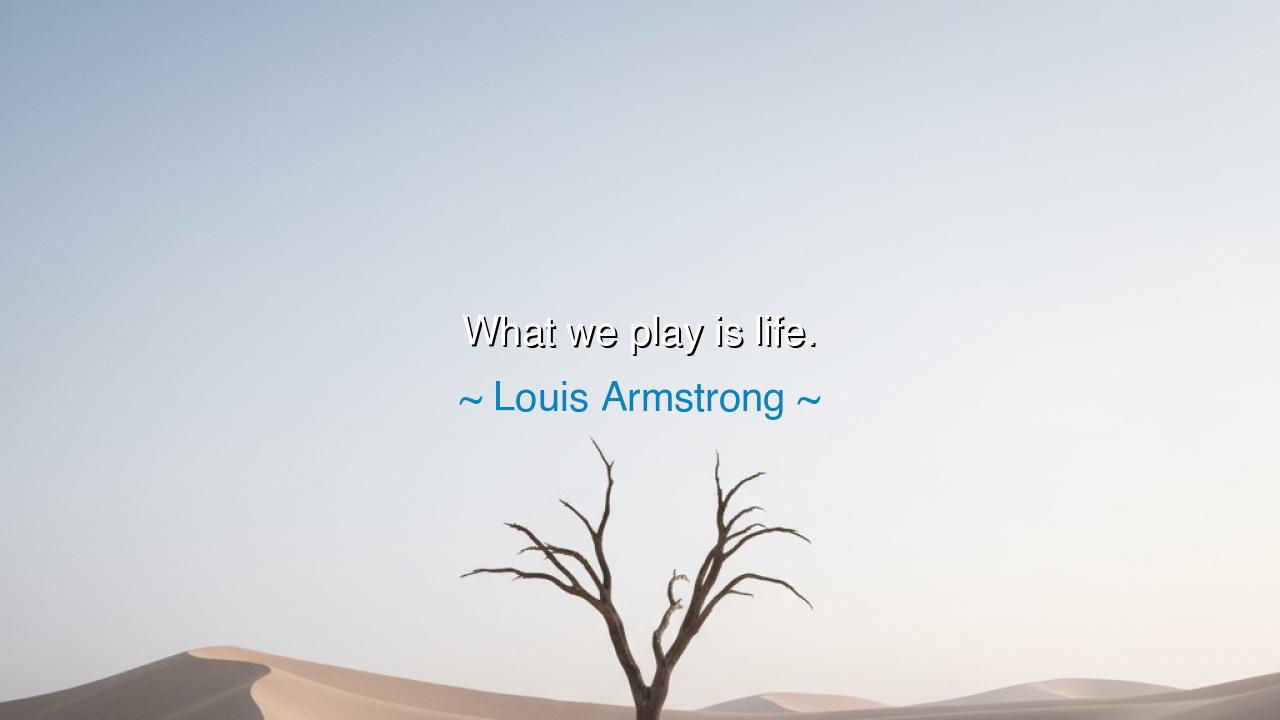
What we play is life.






“What we play is life.” – Louis Armstrong
In these simple yet soul-shaking words, Louis Armstrong, the father of jazz, speaks with the wisdom of a man who turned sound into spirit. When he says, “What we play is life,” he is not merely describing music—he is revealing a philosophy. For to Armstrong, music was not an escape from the world, but its purest expression. Each note from his trumpet carried the laughter, the pain, the sweat, and the hope of living. The rhythm was the heartbeat of humanity; the melody, its memory; the improvisation, its freedom. Through his horn, Armstrong played the story of life itself—with all its brokenness and beauty entwined.
The origin of these words lies in the crucible of Armstrong’s own experience. Born in the poorest quarter of New Orleans, raised among hardship and segregation, he found in music not luxury, but survival. As a boy, he played in the streets and honed his gift in the brass bands of the South. Each performance was more than entertainment—it was life asserting itself against despair. His was a generation that turned sorrow into swing, pain into poetry. When Armstrong later rose to world fame, his music still carried the pulse of those humble beginnings. He understood that jazz, with its improvisation and raw honesty, mirrored existence itself—unpredictable, fragile, yet filled with divine rhythm.
In the ancient world, the philosophers said that the universe itself was built on harmony, that the stars moved in celestial music called musica universalis. Armstrong’s truth was the same, born not of theory but of feeling. To him, every player was part of that great symphony. The blues of the Delta, the gospel of the church, the jazz of the city—they were all languages of the soul. When he declared “What we play is life,” he meant that through art, we reveal the sacredness of ordinary existence. Each joy, each heartbreak, each moment of love or loss finds its echo in sound, color, word, or movement. The artist merely gives voice to what already lives in the human heart.
Consider the story of Armstrong himself on stage, his trumpet raised like a chalice, his smile radiant even in the face of weariness. Once, during a concert, a young musician asked him how to play with more feeling. Armstrong looked at him and said, “You got to live it, baby.” That was his gospel. He knew that the music of the heart cannot be faked—it must be lived. Every performance was a reflection of his journey, from the shadowed streets of his youth to the bright lights of the world’s stages. His sound carried laughter and lament in equal measure, and in that blend lay the truth of life itself.
“What we play is life” also speaks beyond music—it speaks to the art of living. Life, too, is a performance, improvised moment by moment. We are all musicians in the orchestra of existence, creating our melody through the choices we make, the love we give, the courage we show. Some days are in minor key, others in major; some filled with harmony, others with discord. Yet each moment contributes to the grand composition of being. Armstrong reminds us that the goal is not perfection, but authenticity—to live and play with heart, no matter how rough the tune.
In this way, his wisdom becomes a call to presence. To play life is to engage fully with it—to feel deeply, to risk openly, to express truth without fear. It is to treat even the mundane as music, every word and gesture part of a greater rhythm. When we laugh, cry, or create, we are participating in the same mystery that Armstrong’s trumpet sang to the world. He teaches that joy is not the absence of suffering but the transformation of it. Through his horn, he turned sorrow into sound so golden that it lifted the hearts of millions.
So, my child of rhythm and spirit, remember this: whatever your instrument may be—your voice, your craft, your kindness—what you play is life. Do not wait for the perfect moment or the perfect song. Play now. Play with honesty, with courage, with love. Let your work and your being resound with truth, for that is the music of existence. And when your final note fades into the silence, may it be said, as it was of Louis Armstrong, that your song was full of soul—that you did not merely pass through life, but played it, fully and beautifully, to the end.






AAdministratorAdministrator
Welcome, honored guests. Please leave a comment, we will respond soon